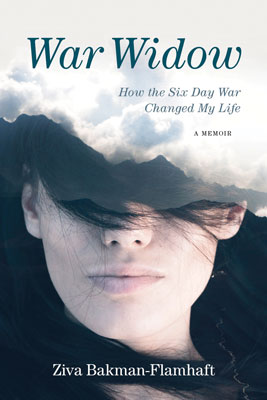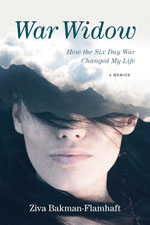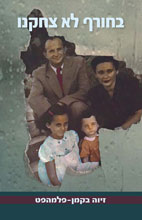
War Widow:
How The Six Day War
Changed My Life
Chapter One
A First Memory
Imma’s glimmering green eyes are draped in fog again. She is staring at the window with a hollow look. Only a few weeks ago, when the sun shone with radiating brilliance, my mother was full of life. Only weeks ago, when summer’s days lingered with light and the bathing season was still on, Imma took my sister Miriam and me to the beach. We went there daily.
“The beach does us good,” Imma would say to us cheerfully.
Only a few weeks ago she was still wearing her bright summer dresses. But today she is wrapped in an old, colorless robe.
It seems it was only yesterday that she made me laugh when she hid behind the living-room curtain, then pushed it aside and made funny faces at me. But today her pretty face is graying like the bleak day that signals the arrival of winter—the season without laughter.

The shed in my mother’s back yard;
then and now
I am a little girl, not yet four. Still, I sense that the days are shorter and that my beautiful mother, whom I love so much, is sinking into an abyss of sadness and pain. The raindrops are hitting the windowpane, and I am scared of the coming winter because in winter Imma gets ill.
In my innocence I do not understand what a “nerve doctor” is, but I hear that Imma goes to one. I do not understand what electric shocks are, but I hear that Imma gets them when she goes to her doctor. I know that Imma will stay in bed in the coming days, that she will cry, and that I will be alone at home with her.
Miriam, who is ten, is going to school, but I am at home with Imma because there is no one to take me to nursery school. My father, who I call Abba, goes to work early, and my aunts have children of their own. Only my grandmother comes occasionally, but when Imma gets very sick, she and I move to my grandparents’ apartment, or sometimes stay with one of my aunts.
***
On the day I was born, in Israel, then Palestine, the moon eclipsed Jupiter, the planet associated with luck and good fortune. Its blackness may have been a sign of things yet to come my way. On earth, too, darkness outshone sunlight, for World War II was raging.
On that day, even as Allied forces relentlessly pounded Axis positions, and in spite of the losses it had suffered, Germany vowed to continue its war efforts. As hundreds of American bombers destroyed the Reich’s aircraft factories, President Franklin D. Roosevelt presented to the United States Congress a budget of nearly one hundred billion dollars, anticipating that the war would last eighteen months longer.
Meanwhile, activists led by the anthropologist Margaret Mead and the playwright Rachel Crothers protested the declining status of women as a result of the prolonged war and demanded their advancement to policy-making positions. Nearly a quarter of a century later, I, too, would become an activist, preoccupied with the status of women affected by war.
In the Middle East, on the day I was born, Arab states signed an agreement to further their common interests, the most important of which was the prevention of the establishment of a Jewish state in Palestine. There, David Ben Gurion, head of the semiautonomous Jewish government, gave a moving speech, reaffirming the existence of a sole Jewish nation in spite of the dispersion of its people the world over, and called for national renewal in its native homeland.
It would take four years and three months longer for Ben Gurion to realize his vision and proclaim the creation of the State of Israel. The announcement, on May 14, 1948, came after a long underground war against Britain, and after fighting between Arab and Jewish factions had escalated into bloody, all-out war.
I do not know whether the darkness cast over Jupiter on the day I was born truly influenced the course of my life. But what transpired on that day affected the lives of everyone in my country, leading up to the day of its birth and continuing to the day of this writing.
***
I entered this life in the winter of 1944, in the future Jewish state. Britain, ruler of the seas, had controlled the area by a League of Nations mandate since the defeat of the Ottoman Empire in the First World War. I have occasionally wondered how much joy my birth brought our family, for it was in wintertime, when the cold paints everything gray and the winds hums with gloom, that my mother suffered from her recurring depressions.
I am thankful that since that winter day I have been able to build a full and satisfying life. Yet I yearn for more. I want to uncover hidden layers of my inner self and let the artist in me flourish, as my teachers, long ago, had promised me it could. I want to write novels about elders’ love, about intense passion, about women who refuse to end their lives gracefully. I want to never stop yearning.
Perhaps this yearning, for colorful moments that turned the blackness away, is what helped me endure those dark grinding days when I coped with my mother’s illness and my father’s inability to handle it.
In the past I viewed myself as a fragile child, a frail girl, and a weak young woman. But the picture that emerged while I was writing my story revealed a different self. I discovered that an inner strength I had not been aware of emerged any time I found myself in the midst of a personal tragedy or difficulty. In contrast to that frail person I held myself to be, I discovered a strong child who endured hardship from a young age, a smart child who knew how to protect herself when others could not, an observant teenager who found it hard to accept the innate gender inequality I saw around me, and a young woman who finally came into her own.
***
I never asked my parents why they had chosen to have me in a faraway hospital rather than the alternative close to their home in central Tel Aviv. Maybe it was my mother’s illness that led them to choose a bigger and more modern hospital, or perhaps it was based on a superstition she had about the old hospital’s back-entrance morgue.
I remember well that back entrance, which I passed every day on my way to and from school. The sight of a figure wrapped in black being carried on a black stretcher out to a large black hearse used to curdle my blood. If only I could walk by with my eyes closed, I would think. I still recall the horror I felt, at age eight or so, when I saw two men bearing a small stretcher that carried a tiny body to that horrible black vehicle, which was far too big for that little person who once was. I wanted to flee, but in the grip of fear my legs slowed down, as if they had a will of their own. It was the day I learned that children, too, could die.
Six weeks before my mother’s due date, my parents endured the long taxi ride to the new hospital only to be confronted by nurses who did not believe my mother when she screamed, “My baby is coming!” They scolded her for exaggerating her condition and demanded that she exercise self-control. They soon had no choice but to believe her: I pushed my way out then and there.
“You did what you wanted already then,” my mother often told me, with both admiration and irritation. “You would have fallen to the floor if I hadn’t caught you!”
She had caught me in her hands, in winter, her dark season. It was with a measure of gratitude that I listened to that story and to a similar one: When I was eighteen months old she brought me to the hospital, dehydrated because I could not keep food down.
“Why did you bring us a dead baby?” the nurses demanded of her.
“She’s alive!” my mother insisted.
When one of the nurses moved her finger back and forth in front of my eyes to prove my mother wrong, I followed her hand, showing that I was indeed alive.
“You doubted me,” my mother scolded. “Now treat her.”
“Take her home and nurse her the way only a mother can,” a different nurse whispered in my mother’s ear. And so she did. Using a small spoon, throughout the night, she poured ten cups of sweetened tea into my small body.
“I did what no nurse would have done,” she told me repeatedly. And she did it even though she did not want me. She told me that, too, as she did about her desire to end her life.
“If it weren’t for your sister and you, I would have committed suicide a long time ago,” she told me when I was a child, a teenager, and an adult. I do not know whether she chose life because we cast a ray of hope into her existence, or because she felt responsible for us. Either way, I was glad she chose life, though I did not like to carry the burden of being responsible for her living in misery, only for us.
***
Old memories may fade away. Some may be erased. Others remain sharp and clear, as if the events have just happened, and so it is with the memories I have of my mother’s bouts of illness.
When my mother was unable to care for my sister and me, I moved with her to my paternal grandparents’ house. Miriam moved in with our Aunt Tovah, my mother’s older sister, who lived closer to her school. My father, at the time working for a leading newspaper, alternated visits to both households.
I was two and some. My mother was in bed in an adjacent room while my grandmother dressed me. When she finished putting on my clothes, she presented me with a new pair of shoes, which she or my father had bought for me. Happy to see them, I began to jump up and down on her bed as if it were a trampoline, screaming excitedly, with each leap, “I have new shoes!”
Having new shoes was not a small matter at that time of belt tightening, which began during World War II, continued through Israel’s War of Independence, and lasted throughout a period of austerity that stretched into the 1950s. Though I was too young to understand those circumstances, I must have sensed the value of new shoes.
Unable to put them on my feet because I would not stop bouncing, my grandmother snapped, angrily, “No wonder your mother is so sick, with a wicked child like you.”
Each word she uttered in her steady, deliberate tone landed on me like a blow; each word of the momentary scolding that must have been my grandmother’s intention seared like a burn. And in my young mind the link between my mischief and my mother’s illness was sealed; my grandmother’s words echoed, repeatedly, multiplying as if to punish me incessantly.
I do not remember whether I stopped jumping then. But I have never forgotten the shiny redness of the laced shoes, the whiteness of the duvet cover on my grandmother’s bed, or the pale tones of the yellow and white stenciled walls in the room. The walls, caressing with their soft colors, swallowed my grandmother’s words and soothed my teary eyes.
Looking back at that moment, I want to protect the little girl that I was. Worse than the harshness of my grandmother’s tone was her accusation that my behavior was the reason for my mother’s recurring depressions, under the shadow of which my father, my sister, and I lived. If that was not enough, in her bad moments throughout my childhood my mother called me horrible, offensive names that not even an adult should hear. Coupled with my grandmother’s accusation, my mother’s disdain made me believe I was the epitome of evil, worthy of punishment. I grew to believe I deserved every calamity that came my way, and each misfortune reinforced that belief, which engulfed me in dark fears for many years to come.
Even so, as time passed my mother got better, and so did my lot. By the time I grew to become a young woman, Jupiter has cleared, or so it seemed. With a promising outlook and a sense of calm, I felt especially blessed when, at the age of nineteen and a half, I met the most desirable bachelor in Tel Aviv.
***
AVAILABLE AT:
Read the Table of Contents



